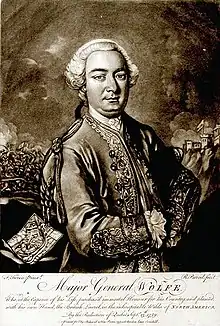How Stands the Glass Around
How Stands the Glass Around, auch General Wolfe’s Song genannt, ist ein englischsprachiges Volkslied.[1] Der Text bringt das Leid von Soldaten zum Ausdruck, weshalb das Lied vor allem bei Armeeangehörigen beliebt war.[2] Behandelt werden etwa die Hilflosigkeit im Krieg und die im Militär verlangte Tapferkeit, aber auch das „Ertränken“ von Angst und Schmerz mit Alkohol.

Hintergrund
Einem alten Mythos zufolge soll das Lied von James Wolfe vor der Schlacht auf der Abraham-Ebene im Jahr 1759 geschaffen worden sein, woher auch der Name General Wolfe’s Song rührt.[1] Tatsächlich war das Lied schon mindestens drei Jahrzehnte vor der besagten Schlacht im Umlauf; weshalb Wolfe höchstens dessen Abänderung oder einfach nur das Singen zugeordnet werden kann.[1][2] Die älteste bekannte Referenz auf die Volksweise ist ein Alternativtext, der von Thomas Odell im Jahr 1729 als Teil einer Balladenoper publiziert wurde.[2][3]
Text
Englischer Text:
How stands the glass around
For shame, ye take no care, me boys
How stands the glass around
Let mirth and wine abound
The trumpets sound
The colours, they are flying, boys
To fight, kill or wound
May we still be found
Content with our hard fare, me boys
On the cold ground
Why, soldiers, why
Should we be melancholy, boys
Why, soldiers, why
Whose business ’tis to die
What sighing fie
Damn fear, drink on, be jolly boys
’Tis he, you and I
Cold, hot, wet or dry
We’re always bound to follow, boys
And scorn to fly
’Tis but in vain
I mean not to upbraid you, boys
’Tis but in vain
For soldiers to complain
Should next campaign
Send us to Him that made us, boys
We’re free from pain
But should we remain
A bottle and kind landlady
Cures all again
Deutsche Übersetzung:
Was steht das Glas herum
Habt keine falsche Scham, Jungs
Was steht das Glas herum
Lasst Heiterkeit und Wein walten
Die Trompeten erklingen
Die Fahnen, sie wehen, Jungs
Zum Kämpfen, Töten oder Verletzen
Möge man uns trotzdem finden
Zufrieden mit unserem harten Weg, Jungs
Auf dem kalten Boden
Warum, Soldaten, warum
Sollten wir melancholisch sein, Jungs
Warum, Soldaten, warum
Deren Geschäft es ist zu sterben
Pfui diesem Seufzen
Vergesst die Angst, trinkt weiter, seid fröhlich Jungs
Er, du und ich sind es
Kalt, heiß, nass oder trocken
Wir sind immer zum Folgen verpflichtet
Und verachten das Fliehen
Nichts als unnütz
Ich will euch nicht rügen, Jungs
Nichts als unnütz
Für Soldaten zu jammern
Sollte der nächste Feldzug
Uns zu Ihm schicken, der uns gemacht hat
Sind wir frei von Schmerz
Aber sollten wir bleiben
Eine Flasche und eine nette Wirtin
Heilen alles wieder
Melodie
.png.webp)
Weiterverwendung
Trivia
- Ein im Jahr 1955 veröffentlichter Artikel argumentiert, dass es sich bei How Stands the Glass Around um das Lieblingslied von Alexander Hamilton gehandelt haben könnte.[6]
- Alexander Graydon zitiert das Lied in seinen Memoiren.[7][2]
Weblinks
- Ben Walker: How Stands the Glass Around. Musikaufnahme auf YouTube.
- John Townley: How Stands the Glass Around. Musikaufnahme auf YouTube.
- Brandon Fisichella: The Soldier's Lament: How Stands the Glass Around?. Videoessay auf YouTube.
Einzelnachweise
- W. Chappell: A Collection of National English Airs, Consisting of Ancient Song, Ballad, & Dance Tunes, Interspersed with Remarks and Anecdote, and Preceded by an Essay on English Minstrelsy. 1840, S. 48 (britisches Englisch, archive.org [abgerufen am 6. Februar 2022]).
- The Country 'squire: together with How stands the glass. In: americanantiquarian.org. American Antiquarian Society, abgerufen am 1. Juni 2020 (amerikanisches Englisch).
- Thomas Odell: The patron: or, the statesman's opera. As it is acted at the theatres in London. By Mr. Odell. Dedicated to the Right Honourable the Earl of Sunderland. 1729, S. 7 (englisch).
- Siege of Quebec, a sonata for the harpsichord or piano-forte, with accompaniments for a violin, violoncello, & tympano ad libitum, composed by W. B. de Krifft. (archive.org [abgerufen am 24. Januar 2021]).
Siege of Quebec, a sonata for the harpsichord or piano-forte, with accompaniments for a violin, violoncello, & tympano ad libitum, composed by W. B. de Krifft. In: Musikalische Korrespondenz der Teutschen Filharmonischen Gesellschaft für das Jahr 1792 [sic]. Nr. 41, 1792, S. 322–323 (archive.org [abgerufen am 6. Februar 2022]). - Wilderun ― How Stands the Glass Around? (Live at The Middle East). Webvideo auf YouTube. 20. Mai 2013, abgerufen am 24. Januar 2021.
- What Was Hamilton's "Favorite Song"? In: Omohundro Institute of Early American History and Culture (Hrsg.): The William and Mary Quarterly. Vol. 12, Nr. 2, April 1955, S. 298–307, doi:10.2307/1920510 (englisch).
- Alexander Graydon: Memoirs of His Own Time: With Reminiscences of the Men and Events of the Revolution. Hrsg.: John Stockton Littell. Lindsay & Blakiston, 1846, S. 164 (englisch, archive.org [abgerufen am 6. Februar 2022]).